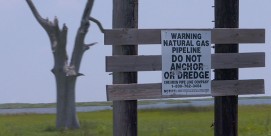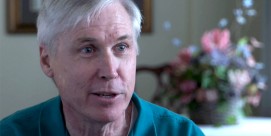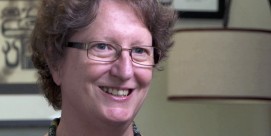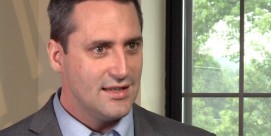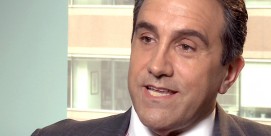Leith Anderson Extended Interview
Read more of Fred De Sam Lazaro’s November 14, 2006 interview in Minnesota with Leith Anderson, interim president of the National Association of Evangelicals:
Q: Why did you agree to take on for the second time the mantle of leadership of the National Association of Evangelicals?
A: I was not surprised to be asked, because I served as an interim president concluding in March of 2003, so I had experience. I’m well acquainted with the evangelical community and known by many in the evangelical community, so it was time to step up and take a responsibility that I think that I am adequately equipped to do.
Q: What is your biggest challenge, your biggest responsibility right at the moment?
A: Well, the National Association of Evangelicals is an organization that is 60-some years old, has about 60 member denominations as well as individual churches, and a constituency that is variously numbered in the tens of millions, so the responsibility is to give overall leadership, to be a spokeperson on behalf of this group and to provide continuity and stability at a time when there has been less than best press.
Q: What do you think are some of the most misunderstood things about evangelicals in the broader media and in the general public?
A: In the media I think there has been a growing understanding over the last 10 years, at least in my experience with the press, in the broad diversity among evangelicals. I think in the past there has been a misperception that the group is something of a monolith in terms of race and politics and a multitude of other areas where individuals have been perceived as the spokepersons for many when in fact they may be the spokespersons only for some. The integrating motif of evangelicals is a belief in the Bible and the expectation of having a personal relationship with God through Jesus Christ, so those are spiritual values, and beyond that the diversity comes in race and background and politics and a whole array of differences.
Q: Have “evangelical” and “Christian right” come to be synonymous in America today?
A: I think that is the misperception of some, and perhaps that’s because those voices have been largely heard. I don’t know whether this is a correct statistic or not, but following the last general election one of the numbers that I read in the press was an estimate that one-third of evangelicals voted as Democrats and two-thirds voted as independents or Republicans. If that number is correct, that would show a two-to-one diversity at least in terms of blue and red. There are certainly many evangelicals who hold conservative right politics, but there are many who do not.
Q: Was that statistic a consistent reflection, or was it a quirk driven by the politics of the moment?
A: I think that has shifted. Historically, evangelicals have been strong in the South, and the South was historically Democratic. The evangelicalism of the South has continued to remain strong. The politics of the South switched to become far more Republican, and therefore evangelicals were more voting Republican. However, the evangelical community includes broadly the African American church, many of whom have historically voted in the Democratic camp, so it depends on which segment you’re talking about. There are regional differences, there are denominational differences, and there are racial differences.
Q: What keeps the evangelical community together?
A: Again, the integrating motif, what keeps the community together is belief in the Bible, taking it seriously, and belief in requiring a personal relationship with Jesus Christ, so it is experiential. In terms of the Bible, that is the core of truth; in terms of faith it is experiential faith.
Q: A week after the national midterm elections that so significantly changed our government, what are your reflections as an evangelical taking over a national evangelical organization? What do you think happened in the election?
A: My take is that politics are extremely complex; they are driven by current issues; they are generally local. I think it was Tip O’Neill who said all politics are local. In this election it appears that Washington significantly affected local outcome, and that relates to the war in Iraq, it relates to dissatisfaction with incumbents. We know that frequently incumbents in Congress lose at the midterm election of the second term of a president, so there were multiple factors all coming together in the same election, and evangelicals are part of the broader community, and as part of the broader community [they] are participants in the broader decisions that are being made.
Q: Your predecessor Ted Haggard was fairly visible in a political sense – associated with the White House, politically outspoken. How does your leadership style compare with his?
A: Well, I think the comparison is to be made by others, not to be made by me. Interestingly, there was a previous president of the National Association of Evangelicals who was sometimes criticized for too close an alignment with the Clinton administration and participating in Clinton admin activities, so the criticism is not new, and individuals are not always speaking on behalf of the broader constituency. They are speaking as individuals.
Q: But Haggard was at the helm of a national organization. Are you politically involved, and do you intend to be outspoken on social issues that have been important to evangelical Christians?
A: There are some political issues on which I have and will speak, although I do not see myself as some one who succumbs to Potomac fever or largely engages in that. I’m the pastor of a local church, and in our local church people in the congregation have run for office and been elected, but we don’t talk about that within the life of the congregation.
Q: What are the issues that most concern you, that you think evangelicals ought to be involved with?
A: I can tell you issues that I’m personally concerned about, and of course I would extend that to other evangelicals and wish that they would share those concerns. I’m concerned for the poor. I’m concerned for justice for the disenfranchised. I have a great concern and the church of which I am a part is deeply involved in the HIV/AIDS issues in Africa and concerned that we be responsible in providing aid and sustenance and encouragement and everything that we can possibly do. I do share certain aspects of the social agenda in terms of being pro-life, and while not all evangelicals would share that that would be pretty broad-based within the evangelical community — a desire to be a protector of the unborn.
Q: How do you come down on the teaching of intelligent design?
A: Well, I’m not an expert on that, so as a lay person I certainly am aware of intelligent design, and because I am a believer in God and believe that God is ultimately behind all that exists, of course I believe in intelligent design, and therefore I think it’s a correct understanding of reality.
Q: So you think it ought to be taught alongside evolution in our schools?
A: It’s always a difficult question of what should be taught in schools. There are some ways in which you would prefer that neither be taught in schools and that the choices be made within the church and other communities in terms of what is taught. I am certainly wide open to diverse opinions being taught within appropriate classrooms in schools and therefore think that there is a place for the teaching of intelligent design.
Q: Alongside evolution in the science class?
A: I certainly do think that an educated person today needs to understand what all the arguments are for evolution, so it is appropriate within education that evolution be taught as one alternative to a diverse opinion of many people of how reality has come to be.
Q: Is it your position that this should be taught within a science curriculum or in a broader philosophical context?
A: It’s interesting that you say, should this be taught in the science class and should this be taught in the philosophy class, because I reflect back on my own education in public schools, and I don’t always recall who is my science teacher and who is my history teacher, so where it’s taught probably is dicing it down to a fine line, and if it is an acceptable alternative that it be taught in a different classroom, I’m okay with that.
Q: Why do you think evangelical activism on HIV/AIDS, on working for peace in the Sudan doesn’t get headlines? Why do people associate evangelicals only with social issues in North America rather than broader international social justice issues that so many evangelicals are engaged in?
A: Historically evangelicals have been broadly involved in social issues. There’s a new film coming out in January about William Wilberforce who was the British minister of Parliament who advocated for the eradication of slavery within the British Empire, and that will be broadly embraced in the evangelical community Today evangelicals have been significantly involved in the eradication of sex trafficking around the world, in the HIV/AIDS issue, poverty, war. Why are evangelicals not known for those things? I suppose it’s because the press and the political sector are not greatly engaged in those issues, and so people become known for how they relate to whatever is the current political headline. Not that those things are not important. They are also important, but we need to be engaged in justice and good within the world on a broad base.
Q: Do you intend to steer more of a course that goes in that broader direction than your predecessor? Ted Haggard was known for speaking out on issues like the gay marriage amendment in Colorado and others, or will we be hearing differently from you on some of these issues?
A: I certainly have no obligation to continue his or anyone else’s agenda. I do think that Ted Haggard was particularly involved in political issues in Colorado, which are not always the same political issues elsewhere. As an interesting example, the Colorado Springs Gazette and Rocky Mountain News and Denver Post carried a multitude of front-page articles about what happened with him in the beginning of November and his political views and his fall from position. I had a conversation with a reporter from the Colorado Springs Gazette who said they had done 22 major articles. I live in Minnesota, where the Minneapolis Star Tribune did 8 column inches on page A-10 next to a furnace ad, so it was not as big an issue here as his political opinions were in Colorado. I think we need to, again, recognize that America is a varied and diverse place, so am I going to perpetuate the issues of Colorado? I’m not.
Q: Do you just not share them as a priority, or do you think your congregants are not as concerned about some of these issues as Ted Haggard’s might have been?
A: I think that the political issues vary by part of the country and day of the week. I do think that the people that are part of Wooddale Church where I am the pastor share probably the same concerns as people in congregations elsewhere. I would tend to take an approach that would say, here is what the Bible teaches, and as an individual Christian you have a responsibility to engage in the political and the social process. But it is clearly your choice to make. It is not my responsibility to dictate to you how you should vote or what you should do.
Q: What do you sense are the main concerns of your congregants in Minnesota, in the upper Midwest? Were you to name two or three or four, what would those be?
A: I’m not sure I’ve ever thought through what the three or four may be. The honest reality is that for most people they are first concerned about themselves and their family and their immediate needs and then how that impacts them. So if they are unable to get employment or health insurance and their children thereby suffer, then they become deeply engaged in those particular issues. Beyond that, surely we become concerned about broad social and moral issues. The issue of abortion and being for protection of the life of the unborn is a top priority among evangelicals, and that has been a galvanizing force politically, so there have been evangelicals who have actually disagreed with many other political positions but voted for candidates with the hope that they would significantly reduce abortion in America. It may well be that at the point that that is either resolved or there is a complete deadlock over the abortion issue, that other issues will rise to the surface and you will see more of a fracturing of the evangelical community in terms of how voting is done because of which other issues are then chosen.
Q: You gained some notoriety coming out in favor of an evangelical environmental initiative, acknowledging that we face global warming. Is that one of those issues which is potentially a fracturing issue?
A: The evangelical climate initiative, which had 86 signatories (in alphabetical order, so with Anderson I was at the top of the list), had as a priority to put climate concerns, or as we would sometimes say creation care issues, on the evangelical agenda. I think that effort was highly successful, so it has significantly come into evangelical conversation — not that it hasn’t been there for a long time, but it became broader and better understood, and I think clearly the direction is that evangelicals are engaging in this issue. A recent Newsweek poll reported that a high percentage of evangelicals are significantly concerned about climate care and related matters, and it makes sense, because as evangelicals we say that we believe the Bible, we take the Bible seriously, the Bible is our guide for faith and practice, and the Bible says that God is the creator of the universe and that we are to be stewards of that which we have on his behalf. So of course we would be concerned about the climate.
Q: The environment has been a polarizing issue in world of politics, with the US backing out of the Kyoto treaty with the assent of Bush administration. Would you support the US becoming a signatory to the Kyoto protocols?
A: I’m not well enough informed to be an expert to address the Kyoto protocols. Certainly the US needs to be recognized as a leader in the world, and if we are to be a leader in terms of economics and culture and other ways, then I think we should also be a leader in terms of taking care of what God has created.
Q: What are your reflections on what has happened since the midterm elections? Do you see the evangelical movement differently? Do you see it expressing itself differently, coming to some point in a cycle of growth? Do you perhaps sense an historic landmark that the election brought into higher relief?
A: It’s always difficulty to get a broad perspective on short notice. I read a quote recently that was attributed to Chou En Lai. I am not sure if he was the one who actually spoke it. Someone asked him what he thought of the French Revolution, and his answer was, “It’s too soon to tell.” We have to be cautious that we don’t make an immediate evaluation of what may be, in fact, inconsequential. But let me give you what may be a long answer to the question. Evangelicals were marginalized in the early part of the 20th century and the middle part of the 20th century. It dates back to the Scopes Trial, to the ascendancy of liberal Christianity in North America, and a multitude of other factors, but I think it’s safe to say that in that marginalization evangelicals spoke to one another but were not largely heard by the mainstream. That started to change around 1950 and was most centered in Billy Graham, who was widely known and an evangelical. And then in 1976 with Jimmy Carter’s election to the White House and Time magazine declaring the year of the evangelical, evangelicals came more and more into positions of influence and mainstream in America with little experience, often not knowing how to speak to the mainstream or to adequately communicate ideas, because evangelicals had been marginalized, and those that are on the margins of society frequently don’t know how to deal with the center of society. In the last 20 years especially, evangelicals being in the mainstream have been figuring this out and learning how to do it. There is now greater experience and I hope a maturity in the movement that will be reflective and responsive and will both advance the cause of Jesus Christ and be beneficial to society.
Q: Did the election suggest potential fractures within evangelicalism, and how injurious might they be? Are there any schisms in the making?
A: In my opinion, within recent years we have had growing polarization in America and siloing, so it’s everywhere. If you look at your radio dial, we are narrowingcasting more than broadcasting, and within our culture we are shouting in a louder and louder voice to fewer and fewer people. And that’s distressing to me, because I prefer that we have unity on at least some significant issues. Evangelicals are not exempt from the polarization and fracturing that has happened to the rest of the society, and, yes, we are suffering from that as well, and we have different voices and divergence. And that’s not widely understood by people who are not evangelicals. They tend to understand that in their arena but don’t understand it in other arenas, and that would probably be typical of us all. So, yes, there is fracture.
Q: Your organization is one effort to keep the cohesion, and you spoke of integrating motifs. In the secular political arena, where do you see trends leading, particularly in the 2008 political cycle, which has already begun? What do you see as you look ahead?
A: On an immediate basis what I see is that there is going to be an effort initially following this election for people to communicate with each other and to find common ground. I think that that is very good and a hopeful sign. Whether that will last very long is probably anybody’s guess, and the 2008 election is so far off it is difficult to predict. What I anticipate is that evangelicals will increasingly will go to what is our central core message, and our central core message is belief in the Bible and commitment to Jesus Christ, and that other matters that have too much been perceived as central will be come secondary or peripheral to who we centrally are.
Q: Do you see any kind of humanizing force or do you sense any greater push toward ecumenism in America among religious leaders than in the recent past?
A: It’s difficult to generalize, but, to the contrary, I think that around the world there is a great deal of fear. I think war and terrorism and other issues have made people frightened, and that has often driven them back to their social ethnic and religious roots, and that has distanced people more than it has brought them together. What I would desire and hope for is that we would find our common ground, be able to be respectful of our differences and be able to fairly hear one another in terms of what are our beliefs and persuasively speak on behalf of our beliefs.
Q: How would you describe yourself?
A: I am the son of an immigrant from Europe. I grew up in metropolitan New York City and northern New Jersey, was educated in public schools there, went to Bradley University in Peoria, Illinois, graduate school in Colorado and [got] a doctorate in California. For 30 years I have been senior pastor of Wooddale Church in suburban Eden Prairie, and most of all what I am is a pastor in terms of what I do professionally.
Q: Why did you settle in Minnesota?
A: I love Minnesota. Minnesota represents to me the best of America in terms of people being kind to each other and gracious and having variety and being welcoming. Minnesota is where we have the first or second longest life expectancy, the lowest unemployment, the greatest voter turnout. I think the statistics indicate we have had more immigrants from Africa in the last 5 or 10 years than the rest of America combined together. Minnesota is a wonderful place.
Q: There is also a seeming political schizophrenia in Minnesota, the state of Senator Paul Wellstone and Governor Jesse Ventura, of the first Muslim congressman, Keith Ellison, and Michele Bachman, a very outspoken evangelical Christian Republican candidate who fits the classic stereotype that you think mischaracterizes evangelicals. What do you think it says, the election of both Ellison and Bachman to Congress?
A: I think that reflects what is happening in America, that we have a growing Muslim population, so you would expect that at some point there would be a Muslim elected to Congress. We have many people who are very conservative in terms of their beliefs and their commitments, and so you would expect that in their district they would elect someone who would reflect their positions.
Q: Living side by side.
A Yes, but of course they are from very different congressional districts. People elect those that reflect their points of view and who they are.

